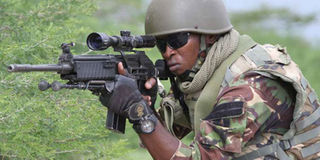Troops must respect human rights

Kenya Defence forces under Africa Union Mission in Somalia (Amisom) soldier takes an aim during patrol Afmadow town on November 22, 2015. PHOTO | JEFF ANGOTE | NATION MEDIA GROUP
What you need to know:
- Protection and respect for human rights are implied in the core requirements of the mandate as well as in its day-to-day security operations.
- The mission should be better equipped to protect the rights of internally displaced persons.
- Many human rights violations and abuses have been recorded in IDP camps, including gender violence, discrimination along clan lines.
- Amisom troops have been accused of violating human rights themselves.
As the Security Council considers extending the mandate of the African Union Mission in Somalia (Amisom), which expires at the end of this month, it is critical that it strengthens the mission’s human rights component.
The current mandate began in July 2015 and deployed Amisom as a peace enforcement mission, a break from the UN’s traditional peacekeeping mission.
This allowed Amisom to fight Al-Shabaab and other armed groups, help the federal government to widen the territory under its control, and establish control over the entire country.
The mandate also empowered the mission to facilitate the delivery of humanitarian aid, the resettlement of internally displaced persons (IDPs), and the return of refugees from neighbouring countries and beyond.
The majority of Somalia’s IDPs live in the Afgooye Corridor — a slice of territory between Mogadishu and the town of Afgooye.
There is no article in the rules underpinning the current mandate that specifically mentions human rights or outlines how Amisom ought to protect such rights. However, protection and respect for human rights are implied in the core requirements of the mandate as well as in its day-to-day security operations. This explains why the UN Support Office for Amisom has been training the troops on human rights.
Similarly, human rights observers from the UN Assistance Mission in Somalia have been supporting Amisom’s Human Rights Office, which is responsible for monitoring, investigating, and reporting human rights violations and abuses.
GROSS VIOLATIONS
Gross violations have taken place in the context of the protracted armed conflict in Somalia, especially in the central-southern regions of the country where Al-Shabaab and other armed militia operate. Some of these violations have amounted to crimes under international law, yet the perpetrators continue to operate with impunity.
This impunity is not just a consequence of the armed conflict, but is also a key driver of the prolonged conflict. This is why it is important to strengthen the human rights component of Amisom’s new mandate.
The mission should be better equipped to protect the rights of internally displaced persons. Many human rights violations and abuses have been recorded in IDP camps, including gender violence, discrimination along clan lines, child recruitment by Al-Shabaab and clan militias, and deliberate denial of humanitarian assistance.
Amisom’s protection of IDPs has been limited by lack of capacity, an issue that the new mandate should address by providing more financial resources and troops.
Al-Shabaab attacks in major urban centres have killed and injured thousands of people over the years. While Amisom has managed to reduce the number of attacks in urban centres, its success has not been replicated across the country, partly due to its inability to stop the forced recruitment of children that continually swells Al-Shabaab’s ranks.
Amisom troops have been accused of violating human rights themselves. In July 2015 there were reports that they had shot directly into a crowd of civilians in Lower Shabeelle. Amisom denied the reports.
SEXUAL EXPLOITATION
Human rights defenders have also documented incidents of sexual exploitation of Somali women and girls by the peace-enforcement troops.
A major challenge to the mission’s ability to ensure that there is no impunity is that the authority to hold troops perpetrating violations to account lies not with it but with troop-contributing countries. This needs to change.
Respect for human rights is critical if Amisom is to have any chance of success in its core mission of bringing peace to Somalia. This will require the new mandate to include articles strengthening protection of civilians as well as monitoring, documenting, and reporting on human rights.
The new mandate should also commit Amisom to remove from its ranks those who violate international human rights laws and hold them to account.
Another aspect which could be considered in the new mandate is making human rights education a part of pre-deployment training for all troops.
Further, the international community should consider increasing funding and surge capacity for the mission to enable Amisom to obtain higher troop numbers from contributing countries.
Dr Mbugua is the Somalia researcher at Amnesty International. [email protected].




